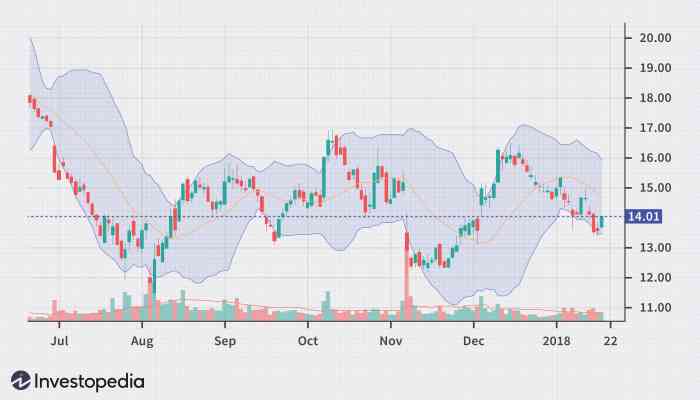Share Price Volatility: What Retail Investors Should Know
As Share Price Volatility: What Retail Investors Should Know takes center stage, this opening passage beckons readers with casual formal language style into a world crafted with good knowledge, ensuring a reading experience that is both absorbing and distinctly original.
Share price volatility is a crucial aspect of financial markets that all retail investors should be well-versed in. Understanding how it impacts investment decisions and the strategies to manage it can make a significant difference in one's portfolio. Let's delve deeper into this intricate world of market dynamics.
What is Share Price Volatility?

Share price volatility refers to the degree of variation in a stock's price over time. It is a measure of how much the price of a stock fluctuates in a given period. Understanding share price volatility is crucial for investors as it can impact investment decisions and risk management strategies.
Calculation of Share Price Volatility
Share price volatility is commonly calculated using standard deviation, which measures the dispersion of data points from the mean. In the context of stock prices, standard deviation helps investors gauge the level of risk associated with a particular stock. The higher the standard deviation, the higher the volatility.
Factors Contributing to Share Price Volatility
- Market Conditions: Overall market conditions, such as economic indicators, political events, and market sentiment, can influence share price volatility.
- Company-Specific Factors: Factors like earnings reports, product launches, management changes, and legal issues can impact a company's stock price volatility.
- Industry Trends: Sector-specific trends, competition, regulatory changes, and technological advancements can also contribute to share price volatility.
- Investor Behavior: The buying and selling patterns of investors, including institutional investors and retail investors, can affect share price volatility.
Importance of Share Price Volatility for Retail Investors

Understanding share price volatility is crucial for retail investors as it directly impacts their investment decisions and overall portfolio performance. Share price volatility refers to the frequency and magnitude of price changes in a stock over a specific period. By comprehending this concept, retail investors can make informed decisions and manage their risk exposure effectively.Share price volatility can impact investment decisions in several ways.
For example, high volatility can lead to significant price swings, offering both opportunities and risks. Retail investors may capitalize on these fluctuations to make short-term profits through trading or opt for long-term investments based on their risk tolerance. On the other hand, low volatility may indicate stability but could also suggest limited growth potential, prompting investors to seek alternative investment options.When comparing the risks associated with high versus low share price volatility for retail investors, it is essential to consider the level of uncertainty and potential rewards.
High volatility is often associated with greater risk due to the increased likelihood of abrupt price changes, which can result in substantial gains or losses. Retail investors with a higher risk appetite may find high volatility appealing for its profit potential but must be prepared for heightened market fluctuations.Conversely, low volatility may offer a sense of stability and predictability, making it more suitable for conservative investors seeking steady returns.
However, low volatility could also indicate market stagnation or lack of growth opportunities, leading to lower returns over time. Retail investors must weigh the risks and rewards of both high and low volatility environments to align their investment strategies with their financial goals and risk tolerance levels
Strategies for Managing Share Price Volatility
When dealing with share price volatility, retail investors need to employ certain strategies to protect their investments and manage risk effectively.
Diversification as a Strategy
Diversification is a common strategy used by retail investors to mitigate share price volatility. By spreading their investments across different asset classes, sectors, and industries, investors can reduce the impact of a potential downturn in any single stock or sector.
This can help protect their overall portfolio from significant losses. However, while diversification can lower risk, it may also limit the potential for high returns if one particular investment performs exceptionally well.
Role of Stop-Loss Orders
Stop-loss orders are another important tool for managing share price volatility. These orders allow investors to set a predetermined price at which they are willing to sell a stock. If the stock price falls to that level, the stop-loss order will automatically trigger a sale, helping investors limit their losses.
Stop-loss orders can help investors stick to their predetermined risk tolerance and prevent emotional decision-making during turbulent market conditions. However, there is a risk that a stop-loss order may execute at a price significantly lower than anticipated in fast-moving markets, leading to potential losses beyond what was initially intended.
Impact of Market News on Share Price Volatility
Market news and events play a significant role in influencing share price volatility. Positive news such as strong earnings reports, new product launches, or strategic partnerships can lead to an increase in share prices, while negative news like economic downturns, regulatory changes, or corporate scandals can cause share prices to plummet.
Examples of Recent Market News Influencing Share Price Volatility
- During the COVID-19 pandemic, news of vaccine developments and government stimulus packages led to sharp fluctuations in share prices across various sectors.
- The announcement of a merger or acquisition deal can cause volatility in the share prices of the companies involved as investors speculate on the potential impact of the transaction.
- Reports of natural disasters, geopolitical tensions, or global economic indicators can also trigger volatility in the stock market, affecting share prices worldwide.
How Retail Investors Can Stay Informed About Market News
- Utilize financial news websites, market analysis platforms, and social media channels to stay updated on the latest market developments and news impacting specific industries or companies.
- Subscribe to newsletters, follow reputable financial analysts, and set up alerts for key market events to receive real-time updates on potential factors affecting share price volatility.
- Participate in investor forums, webinars, and virtual events to engage with industry experts, gain insights into market trends, and discuss the potential impact of news on share prices with fellow investors.
Final Review

In conclusion, Share Price Volatility: What Retail Investors Should Know sheds light on the importance of being informed about market movements, especially for those looking to make wise investment choices. With the right knowledge and strategies in place, navigating the ups and downs of share price volatility can lead to more successful investment outcomes.
Frequently Asked Questions
What is share price volatility?
Share price volatility refers to the fluctuation in a stock's price over a period of time, indicating the level of risk associated with that particular investment.
Why is understanding share price volatility important for retail investors?
Understanding share price volatility is crucial for retail investors as it helps them make informed decisions, manage risks effectively, and optimize their investment strategies.
What are some common strategies to manage share price volatility?
Some common strategies include diversification, setting stop-loss orders, and staying informed about market news and events.
How can market news affect share price volatility?
Market news and events can impact share price volatility by influencing investor sentiment, market trends, and overall market conditions.




